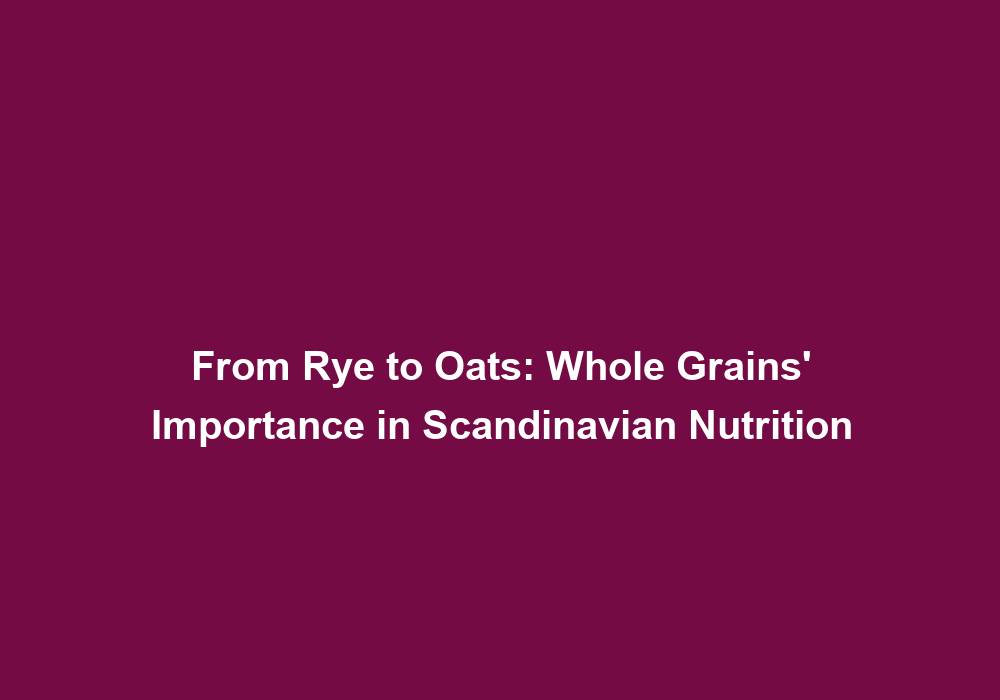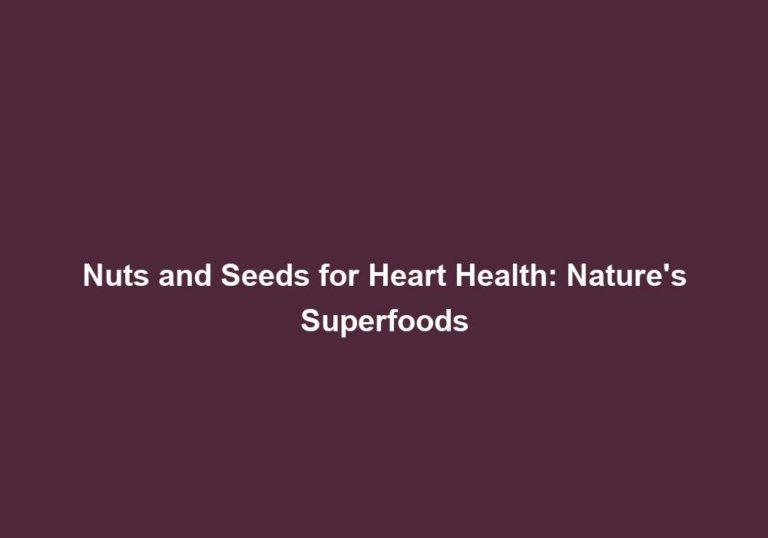From Rye to Oats: Whole Grains’ Importance in Scandinavian Nutrition
Eating a wholesome and balanced diet is vital for maintaining good health and preventing various diseases. In Scandinavian countries, such as Norway, Sweden, Denmark, and Finland, whole grains play a significant role in traditional cuisine and are valued for their nutritional benefits. From the hearty rye bread to comforting oatmeal porridge, whole grains are a staple in Scandinavian nutrition. In this article, we will explore the importance of whole grains in Scandinavian diets and understand why they are considered an essential element of a healthy lifestyle.
What are Whole Grains?
Whole grains are grains that contain all three parts of the grain kernel – the bran, germ, and endosperm. Unlike refined grains, which have had the bran and germ removed, whole grains retain their natural nutrients, fiber, and antioxidants. The Scandinavian diet emphasizes the consumption of whole grains over refined grains due to their numerous health benefits.
Health Benefits of Whole Grains
Including whole grains in your diet provides several health benefits. Here are some compelling reasons to incorporate whole grains into your Scandinavian-inspired meals:
-
Excellent Source of Fiber: Whole grains are packed with dietary fiber, which aids in digestion, helps prevent constipation, and promotes a feeling of fullness. A diet rich in fiber can also help regulate blood sugar levels and reduce the risk of developing type 2 diabetes.
-
Heart-Healthy: Whole grains have been associated with a reduced risk of heart disease. The fiber content in whole grains helps lower cholesterol levels and maintains healthy blood pressure, reducing the risk of cardiovascular problems.
-
Weight Management: Due to their high fiber content and slower digestion rate, whole grains can contribute to weight management. They help control appetite, keep you feeling satisfied for longer periods, and prevent overeating.
-
Nutrient-Rich: Whole grains are a rich source of essential nutrients, including B vitamins, iron, magnesium, and selenium. These nutrients play a crucial role in maintaining overall health and supporting various bodily functions.
-
Reduced Risk of Chronic Diseases: Studies have shown that regular consumption of whole grains is associated with a lower risk of developing chronic conditions such as type 2 diabetes, certain types of cancer, and stroke.
Traditional Scandinavian Whole Grains
-
Rye: Rye is a grain commonly found in Scandinavian countries and is a staple in their traditional cuisine. Rye bread is a beloved food item, often enjoyed toasted with butter and topped with various toppings like smoked salmon or pickled herring. Rye is not only rich in fiber but also provides essential nutrients such as manganese, magnesium, and phosphorus. It has a lower glycemic index compared to wheat, making it a great choice for managing blood sugar levels.
-
Oats: Oats are another important whole grain in Scandinavian nutrition. Oatmeal porridge, known as gröt in Sweden and grød in Denmark and Norway, is a popular breakfast choice. Oats are packed with soluble fiber, which helps lower cholesterol levels and provides long-lasting energy. They are also a good source of plant-based protein and contain important minerals like iron and zinc. Incorporating oats into your diet can help improve digestion, promote satiety, and support a healthy heart.
-
Barley: Barley is widely used in traditional Scandinavian soups and stews. It is a versatile grain that can be added to various dishes to enhance their nutritional value. Barley contains beta-glucan, a soluble fiber that supports heart health and aids in maintaining healthy cholesterol levels. Additionally, barley is rich in antioxidants and provides important minerals like selenium and copper. Including barley in your meals can help boost immunity and promote digestive health.
-
Wheat: While not as prominent as rye and oats, wheat is still used in Scandinavian cuisine. Whole wheat bread and pasta are preferred over their refined counterparts due to their higher fiber content. Wheat provides essential nutrients like folate, niacin, and selenium. It is a good source of complex carbohydrates, which provide sustained energy. Incorporating whole wheat products into your diet can contribute to a balanced nutrient intake and support overall well-being.
Easy Ways to Incorporate Whole Grains in Your Diet
-
Start with Breakfast: Begin your day with a bowl of oatmeal or whole grain cereal topped with fresh fruits and nuts. This will provide you with a nutritious start and keep you energized throughout the morning. You can also try making overnight oats or incorporating whole grain flours into your pancake or waffle batter for a wholesome breakfast.
-
Choose Whole Grain Bread: Opt for whole grain bread instead of white bread for your sandwiches and toast. Look for labels that specifically mention 100% whole grain to ensure you are getting the maximum benefits. Whole grain bread can be enjoyed with a variety of toppings, such as avocado, lean meats, or vegetables, to create a delicious and nutritious meal.
-
Experiment with Ancient Grains: Try incorporating ancient grains like spelt, kamut, or farro into your meals. These grains offer unique flavors and textures, adding variety and nutritional value to your Scandinavian-inspired dishes. You can use them in salads, pilafs, or side dishes to enhance the overall taste and nutrient content.
-
Swap White Rice with Barley: Replace white rice with barley in your pilafs and side dishes. Barley’s nutty flavor and chewy texture make it a delicious and nutritious alternative. It pairs well with vegetables, herbs, and spices, allowing you to create flavorful and satisfying meals.
-
Snack on Whole Grain Crackers: Keep whole grain crackers or rice cakes on hand for a quick and healthy snack option. Pair them with hummus, nut butter, or low-fat cheese for added flavor and satisfaction. Whole grain snacks can help curb cravings, provide sustained energy, and contribute to your daily whole grain intake.
By making these simple switches and incorporating whole grains into your meals, you can enjoy the nutritional benefits of Scandinavian cuisine while promoting a healthier lifestyle.
In conclusion, whole grains form an essential part of Scandinavian nutrition. With their abundance of fiber, important nutrients, and various health benefits, whole grains like rye, oats, barley, and wheat contribute to a well-rounded and nutritious diet. Embrace the rich heritage of Scandinavian cuisine by incorporating wholesome whole grains into your meals and experience the positive impact on your overall health and well-being.
This article is written by an AI language model to provide general information and should not be seen as medical or dietary advice. Consult with a healthcare professional or registered dietitian for personalized guidance on your specific dietary needs.







